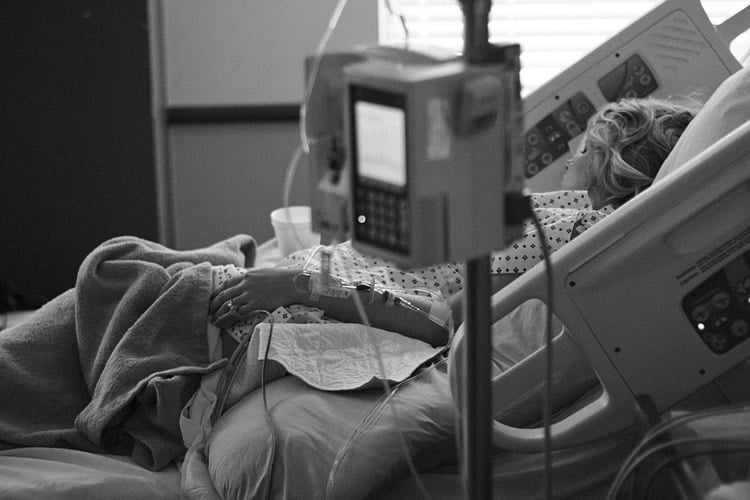Summary: A number of patients in intensive care units for non-brain-related illnesses may suffer from cognitive dysfunction. Inflammation that occurs as a result of infection and problems with oxygen flow to the brain which occur when breathing is affected, could contribute to cognitive impairments.
Source: University of Western Ontatio
A new study led by Western University and Lawson Health Research Institute has found that most patients entering hospital intensive care units (ICU) for non-brain-related injuries or ailments also suffer from some level of related cognitive dysfunction that currently goes undetected in most cases.
The findings were published today in the influential scientific journal, PLOS ONE.
Many patients spend time in the ICU for reasons that have nothing to do with a known brain injury, and most health care providers and caregivers don’t have any evidence to believe there is an issue with the brain. For example, a patient may have had a traumatic injury that does not involve the brain, yet still requires breathing support to enable surgeons to fix damaged organs, they may have issues with their heart or lungs, they may contract a serious infection, or they may simply be recovering from a surgical procedure like an organ transplant that has nothing directly to do with their brain.
For the study, Western investigators from the Schulich School of Medicine & Dentistry and the Brain and Mind Institute and researchers from Lawson assessed 20 such patients as they left the ICU and every single patient had detectable cognitive deficits in two or more cognitive areas of investigation, including memory, attention, decision-making and reasoning. Again, this is in spite of the fact that, on the face of it, they had no clear brain injury.
The discovery was made using online tests, developed by renowned Western neuroscientist Adrian Owen and his teams at the Brain and Mind Institute and BrainsCAN, which were originally designed to examine cognitive ability in patients following brain injuries but for this purpose, are being used to detect cognitive deficits in people who have spent time in an intensive care unit without a diagnosed brain injury.
“Many people spend time in an intensive care unit following a brain injury and, of course, they often experience deficits in memory, attention, decision-making and other cognitive functions as a result,” explains Owen, a professor at Schulich Medicine & Dentistry. “In this study, we were interested to see how patients without a specific brain injury fair after leaving the ICU. The results were astonishing.”
Why cognitive ability declines even in non-brain related visits to the ICU likely varies from patient to patient, but Dr. Kimia Honarmand from Schulich Medicine & Dentistry says the lesson to be learned is that many conditions affect brain function, even though they might not directly involve the brain.

“If you are having trouble breathing, your brain may be starved of oxygen. If you have a serious infection, the inflammation that occurs as a result of infection may affect brain function. If you are undergoing major surgery, you might be given drugs and have procedures that may affect your breathing, which in turn may affect the flow of oxygen to the brain,” explains Dr. Honarmand. “What we have shown here is that all or any of these events can lead to deficits in brain function that manifest as impairments in cognition. And healthy cognition is a vital determinant of functional recovery.”
Dr. Marat Slessarev, Lawson Scientist, says these findings can shift how the medical community treats incoming patients and more importantly, outpatients following ICU visits.
“Historically, the clinical focus has been on just survival. But now we can begin to focus on good survival,” says Dr. Slessarev, also an associate member at the Brain and Mind Institute and an assistant professor at Schulich Medicine & Dentistry. “These sensitive tests will enable doctors to both detect cognitive impairment and track cognitive performance over time, which is the first step in developing processes for optimizing brain recovery.”
Source:
University of Western Ontario
Media Contacts:
Jeff Renaud – University of Western Ontario
Image Source:
The image is in the public domain.
Original Research: Open access
“Feasibility of a web-based neurocognitive battery for assessing cognitive function in critical illness survivors” Kimia Honarmand, Sabhyata Malik, Conor Wild, Laura E. Gonzalez-Lara, Christopher W. McIntyre, Adrian M. Owen, Marat Slessarev, published 12 Apr 2019 PLOS ONE doi:10.1371/journal.pone.0215203
Abstract
Feasibility of a web-based neurocognitive battery for assessing cognitive function in critical illness survivors
Purpose
To assess the feasibility of using a widely validated, web-based neurocognitive test battery (Cambridge Brain Sciences, CBS) in a cohort of critical illness survivors.
Methods
We conducted a prospective observational study in two intensive care units (ICUs) at two tertiary care hospitals. Twenty non-delirious ICU patients who were mechanically ventilated for a minimum of 24 hours underwent cognitive testing using the CBS battery. The CBS consists of 12 cognitive tests that assess a broad range of cognitive abilities that can be categorized into three cognitive domains: reasoning skills, short-term memory, and verbal processing. Patients underwent cognitive assessment while still in the ICU (n = 13) or shortly after discharge to ward (n = 7). Cognitive impairment on each test was defined as a raw score that was 1.5 or more standard deviations below age- and sex-matched norms from healthy controls.
Results
We found that all patients were impaired on at least two tests and 18 patients were impaired on at least three tests. ICU patients had poorer performance on all three cognitive domains relative to healthy controls. We identified testing related fatigue due to battery length as a feasibility issue of the CBS test battery.
Conclusions
Use of a web-based patient-administered cognitive test battery is feasible and can be used in large-scale studies to identify domain-specific cognitive impairment in critical illness survivors and the temporal course of recovery over time.






